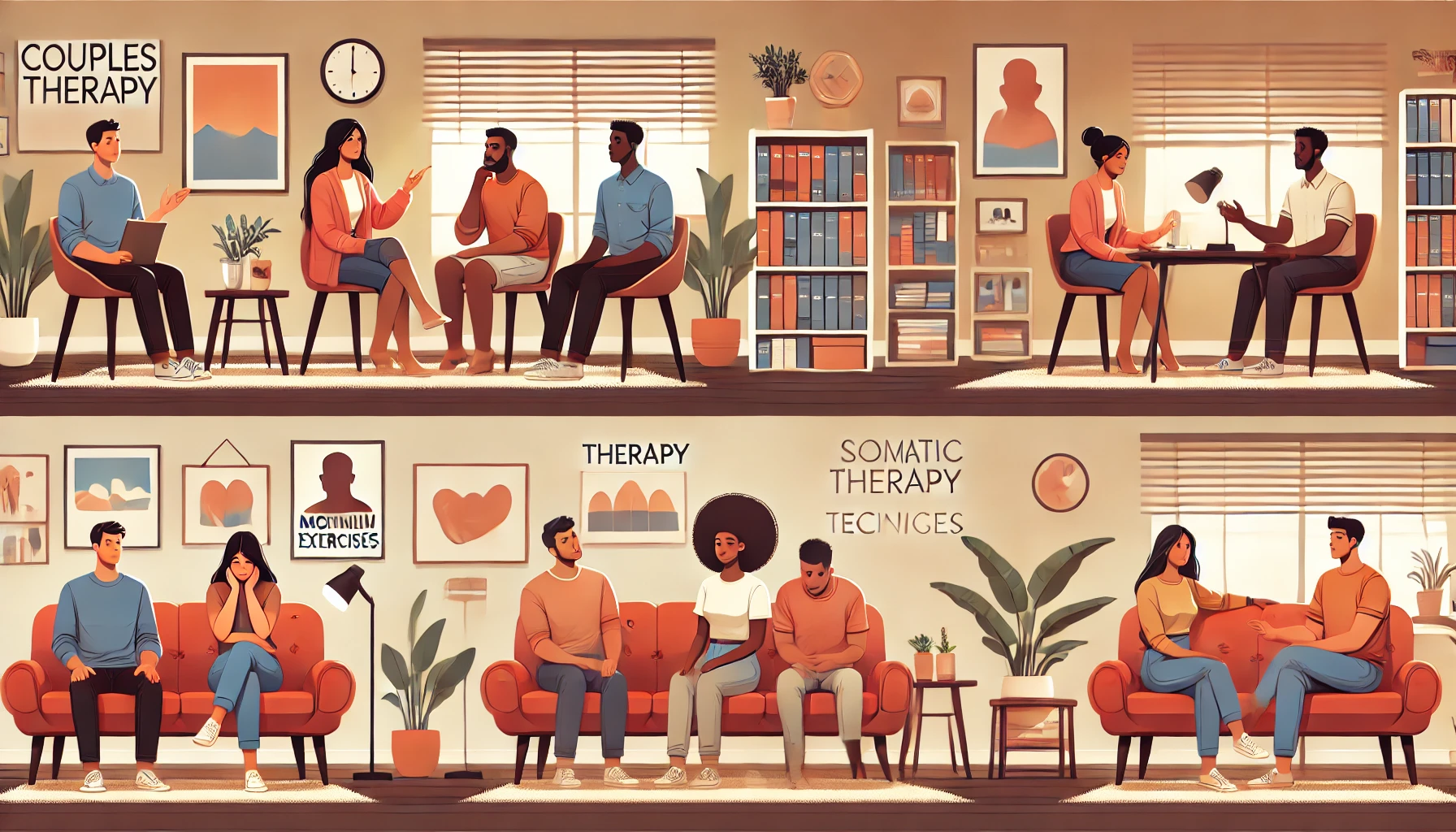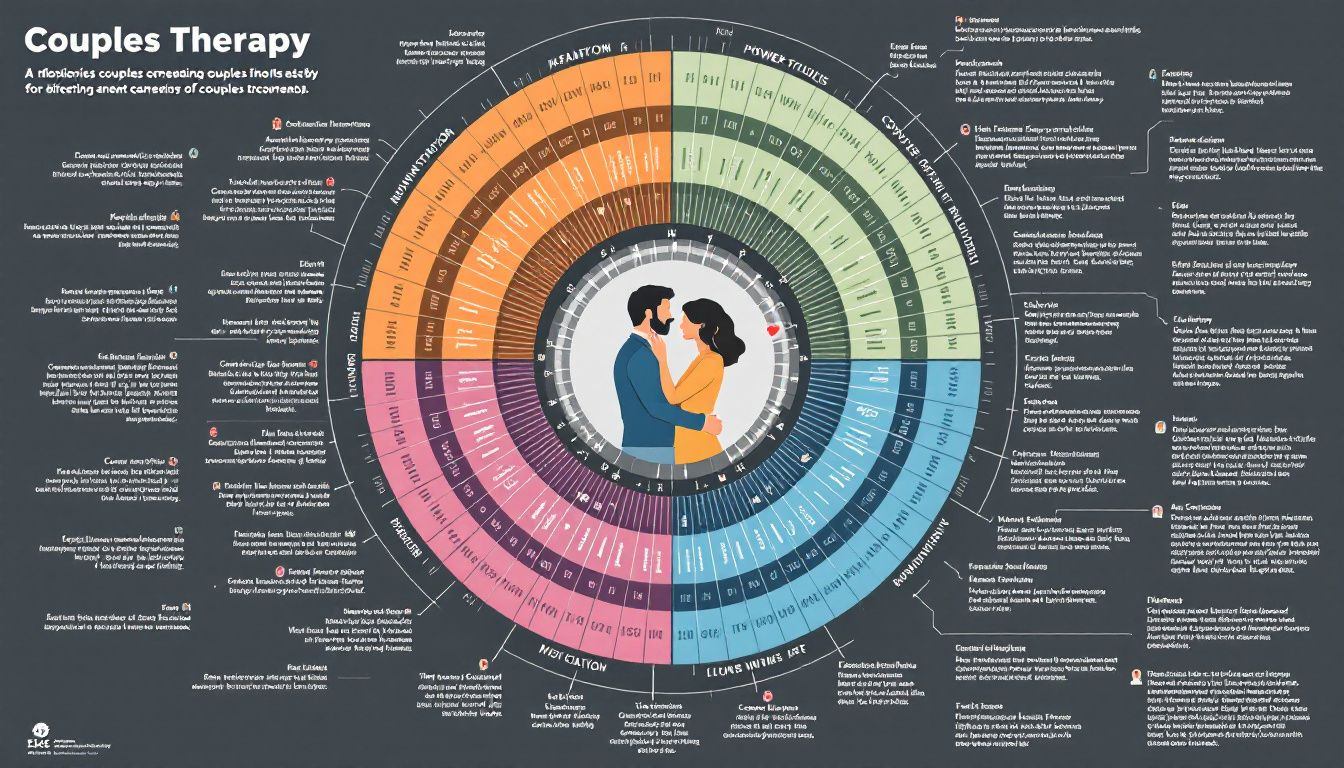A question many partners ask is: does couples therapy work? Research suggests that it often does—between 60% and 72% of couples report significant improvements after participating in therapy. The effectiveness of couples therapy depends on using approaches that are both integrative and evidence-based. Marriage and family therapists, including associate marriage and family therapists, bring professional training in a wide range of proven methods. These include Emotionally Focused Therapy (EFT), Schema Therapy, Integrative Behavioral Couples Therapy (IBCT), ACT Therapy, and the Gottman Method—among many others.
Each of these approaches offers unique strategies for strengthening attachment, improving communication, and addressing recurring emotional challenges. In this article, we’ll look at how these different methods work, what research reveals about their effectiveness, and the key factors that influence long-term outcomes.
Key Takeaways
-
Couples therapy has a high success rate, with 60% to 72% of couples reporting significant improvements in relationship satisfaction after treatment.
-
Methods like Emotionally Focused Therapy (EFT) and Cognitive Behavioral Couples Therapy (CBCT) are particularly effective, with EFT achieving a 70-73% success rate and CBCT showing lasting benefits even five years later.
-
Both partners’ commitment to the therapy process and selecting the right therapist significantly influence the effectiveness of couples therapy.
-
Couples therapy services are available in Los Angeles, offering both in-person and online options to address common relationship challenges faced by residents.
Understanding Couples Therapy
Couples therapy is a therapeutic process aimed at improving relationships by addressing various issues such as recurring conflicts, disconnection, and external stressors. At its core, couples therapy seeks to strengthen emotional bonds and intimacy between partners, fostering healthier relationships built on mutual understanding and trust. Identifying and discussing roles and expectations within the relationship allows partners to gain insight into their dynamics, fostering a more harmonious partnership. Relationship therapy can also be a valuable resource in this journey. Marriage therapy, another term for couples therapy, plays a crucial role in enhancing relationships by providing structured sessions to identify strengths and challenges.
There are several approaches utilized in couples therapy, each with its unique focus and methods. Emotionally Focused Therapy (EFT) enhances attachment and bonding between partners by addressing patterns of disconnection, helping them reconnect on a deeper level. Cognitive Behavioral Couples Therapy (CBCT) aims to identify and alter negative thought patterns that impact relationship dynamics, promoting healthier interactions. Another notable approach is Behavioral Couples Therapy, which focuses on reinforcing positive behaviors to enhance relationship stability and satisfaction. Techniques from Imago Therapy, which emphasizes understanding each other’s childhood wounds and how they affect current relationship issues, are also commonly employed.
Therapists often blend these various approaches to tailor treatment to the specific needs of the couple. This integrative approach allows for a more personalized therapy experience, addressing the unique challenges and goals of each relationship.
Whether it’s through structured programs like the Couple CARE program, which has shown improvements in relationship quality and participant satisfaction, or through a customized blend of therapies, the goal remains the same: to foster healthier, more fulfilling relationships.
Types of Couples Therapy
Couples therapy, also known as couples counseling, comes in various forms, each with its unique approach and focus. Understanding these different types can help you choose the best method for your relationship issues:
-
Emotionally Focused Therapy (EFT): This type of therapy focuses on improving emotional awareness, communication, and empathy between partners. By addressing patterns of disconnection, EFT helps couples reconnect on a deeper emotional level.
-
Cognitive-Behavioral Therapy (CBT): This approach helps couples identify and change negative thought patterns and behaviors that contribute to relationship issues. CBT promotes healthier interactions and long-term relationship satisfaction.
-
Gottman Method: This therapy focuses on building a stronger relationship by improving communication, intimacy, and conflict resolution skills. It uses research-based techniques to enhance relationship stability and satisfaction.
-
Imago Therapy: This approach helps couples understand and resolve unconscious conflicts and improve their communication and intimacy. By exploring childhood wounds, Imago Therapy fosters a deeper understanding of each partner’s needs.
-
Schema Therapy for Couples: This therapy focuses on identifying and changing deeply ingrained patterns or “schemas” that negatively impact the relationship, promoting healthier interactions and understanding between partners.
-
ACT Therapy for Couples: Acceptance and Commitment Therapy (ACT) helps couples embrace their emotions, focus on present experiences, and commit to actions that align with their values, fostering healthier relationships and deeper understanding.
-
Mindfulness-Based Couples Therapy: This approach integrates mindfulness practices to help partners become more present and aware in their interactions, fostering deeper emotional connections and reducing stress in the relationship.
-
Somatic Therapy for Couples: This approach focuses on the mind-body connection, helping partners become more aware of their physical sensations and emotions to enhance communication and intimacy.
-
Holistic Couples Therapy: Taking a comprehensive approach, this type of therapy addresses the physical, emotional, and spiritual aspects of the relationship. It aims to create a balanced and harmonious partnership by considering all facets of the couple’s life.
Each of these methods offers unique benefits, and a skilled couples therapist can help you determine which approach is best suited to your relationship’s specific needs.
When to Seek Couples Therapy
Couples therapy can be beneficial at any stage of a relationship, whether you’re experiencing minor issues or major conflicts. Here are some common signs that indicate the need for couples therapy:
-
Communication Breakdown: If you and your partner are having trouble communicating effectively, leading to misunderstandings and conflicts, it may be time to seek help. Effective communication is the foundation of a healthy relationship.
-
Intimacy Issues: A lack of emotional or physical intimacy can lead to feelings of disconnection and isolation. Couples therapy can help you rebuild intimacy and strengthen your bond.
-
Conflict Resolution: Struggling to resolve conflicts in a healthy and constructive manner can strain your relationship. Therapy can teach you effective conflict resolution skills, promoting a more harmonious partnership.
-
Trust Issues: If trust has been broken and you’re having trouble rebuilding it, professional guidance can help you navigate this challenging process and restore trust.
-
Feeling Stuck: If you feel like you’re stuck in a rut and your relationship is not progressing or growing, couples therapy can provide new perspectives and strategies to move forward.
Recognizing these signs early and seeking couples therapy can prevent further deterioration of the relationship and promote healthier, more fulfilling connections.
How the Couples Therapy Process Works
The couples therapy process typically begins with an initial consultation, where you and your partner meet with a therapist to discuss your goals, concerns, and expectations. From there, the therapist will work with you both to:
-
Identify Patterns and Issues: The therapist will help you identify negative patterns and issues that are contributing to your relationship problems. Understanding these dynamics is the first step toward positive change.
-
Develop Communication Skills: Effective communication is crucial for a healthy relationship. The therapist will teach you skills such as active listening and assertive expression, enabling you to communicate more effectively.
-
Improve Conflict Resolution: Learning healthy conflict resolution skills, such as de-escalating conflicts and finding mutually beneficial solutions, can significantly enhance your relationship. The therapist will guide you through these techniques.
-
Enhance Intimacy: Building emotional and physical intimacy is a key focus of couples therapy. The therapist may suggest exercises and activities that promote connection and closeness, helping you and your partner feel more connected.
-
Work Through Challenges: Whether you’re dealing with trust issues, infidelity, or financial stress, the therapist will help you work through these specific challenges. By addressing these issues head-on, you can build a stronger, more resilient relationship.
This structured approach ensures that couples therapy addresses the core issues in your relationship, promoting lasting positive changes.
Research on Couples Therapy Effectiveness
Research consistently shows that couples therapy can lead to significant improvements in relationship satisfaction for a majority of couples. Studies suggest that between 60% to 72% of couples experience notable improvements in their relationships after engaging in therapy. This high success rate highlights the potential of couples counseling to transform relationships that are struggling with various issues. Relationship counseling plays a crucial role in helping couples navigate challenges and strengthen their partnerships.
Beyond enhancing relationship satisfaction, couples therapy has been shown to positively impact mental health by reducing anxiety and stress levels. Therapy sessions enhance emotional awareness, communication, empathy, and intimacy, helping couples reconnect and strengthen their bond. The benefits of couples therapy are not just immediate but can also be sustained over time. Follow-up studies reveal that the positive effects, such as increased relationship satisfaction, continue to benefit couples long after the therapy has concluded.
Interestingly, the mode of therapy delivery, whether through videoconferencing or traditional face-to-face sessions, does not significantly affect the outcomes. Studies have found that online therapy sessions yield results comparable to in-person sessions, making it a flexible option for couples who may have scheduling or geographical constraints. These findings underscore the versatility and effectiveness of couples therapy in various settings and formats.
Success Rates of Different Therapy Approaches
When it comes to couples therapy, the success rates of different approaches can vary, but some methods stand out for their effectiveness. Emotionally Focused Therapy (EFT) has a remarkable success rate of approximately 70-73% in achieving therapy goals for couples. This approach, which focuses on enhancing emotional bonds and attachment, has been shown to significantly outperform other methods in terms of improving relationship satisfaction. Marriage therapy, often used interchangeably with couples therapy, is highly effective in this context. Even when not all therapy goals are fully achieved, EFT boasts a 90% improvement rate in relationship satisfaction.
Cognitive Behavioral Couples Therapy (CBCT) is another highly effective approach, with around 70% of couples reporting improvements after engaging in this method. CBCT’s long-term efficacy is noteworthy, with follow-up studies showing a substantial effect size of 0.92 even five years after the therapy has concluded. This demonstrates the enduring impact of CBCT on relationship dynamics, making it a valuable option for couples seeking long-term solutions.
Meta-analyses indicate that both EFT and CBCT have similar effectiveness in enhancing relationship quality, highlighting the value of these approaches in couples therapy.
While the success rates can vary, the holistic approach of integrating multiple therapy methods tailored to the couple’s specific needs often yields the best results. Couples and therapists can work together to find the most suitable approach that aligns with their unique challenges and goals.
Factors Influencing Therapy Outcomes
Several factors influence the outcomes of couples therapy, and understanding these can help couples maximize the benefits of their therapy sessions. One of the most crucial factors is the expertise of the therapist. A family therapist or couples therapist with extensive experience and a commitment to ongoing professional development can significantly enhance the therapeutic experience. Choosing a therapist with credentials such as ‘associate marriage’ ensures high-quality therapy. Clients should look for therapists who are both empathetic and directive, as these qualities can improve the effectiveness of the therapy.
The level of commitment from both partners also plays a vital role in the success of couples therapy. When both partners are dedicated to the process and open to making changes, therapy is more likely to yield positive outcomes. Specific challenges addressed during therapy, such as communication breakdowns or trust issues, can also influence the overall effectiveness of the treatment. Creating a safe environment where partners feel comfortable sharing their thoughts and feelings without fear of judgment is essential for successful therapy.
Real-life success stories, like that of James and Susan, illustrate the impact of these factors. Their therapist’s approach helped them prioritize their relationship and foster positive changes, demonstrating how the right therapist and a committed approach can lead to significant improvements.
Understanding and addressing these factors can enhance therapy outcomes, leading to healthy relationships that are more fulfilling.
Common Relationship Issues Addressed
Couples therapy addresses a wide range of relationship issues, helping couples navigate through their challenges and build healthier connections. Relationship counseling plays a crucial role in addressing these common issues and fostering deeper understanding. Common issues include communication breakdowns, trust issues, intimacy problems, and conflict resolution. Improved communication skills gained through therapy enable partners to express their needs without blame, fostering a deeper understanding and connection.
Therapy also facilitates discussions about sensitive topics such as finances, intimacy, and family dynamics. Financial disagreements, for example, can create significant stress in a relationship, making open discussions about money management crucial. Life changes, such as career shifts or children leaving home, can strain relationships, highlighting the importance of proactive communication and planning.
Additional challenges like negative communication, conflicts with in-laws, and differing parenting styles can also be addressed in family therapy with family therapists. Setting boundaries and developing cooperative plans enables couples to navigate these issues more effectively, especially when they reach a breaking point. Developing coping skills can further enhance their ability to manage these challenges.
Whether dealing with affairs that have damaged trust or feeling unsupported by a partner, couples therapy provides a neutral space to work through these challenges and build a stronger, more resilient relationship.
Specialized Couples Therapy
Some couples may benefit from specialized couples therapy, which focuses on specific issues or populations. Here are some examples:
-
LGBTQ+ Couples Therapy: This type of therapy is designed for LGBTQ+ couples, addressing unique challenges and issues that may arise in these relationships. It provides a supportive environment to explore and resolve these challenges.
-
Multicultural Couples Therapy: Designed for couples from different cultural backgrounds, this therapy addresses cultural differences and challenges that may impact the relationship. It fosters understanding and respect for each partner’s cultural perspective.
-
Trauma-Informed Couples Therapy: For couples who have experienced trauma, trauma therapy in Los Angeles, addresses the impact of trauma on the relationship and provides a safe and supportive environment for healing. It helps partners navigate the complexities of trauma together.
-
Addiction-Focused Couples Therapy: When one or both partners are struggling with addiction, this therapy addresses the impact of addiction on the relationship and provides support for recovery. It aims to rebuild trust and promote a healthier partnership.
These specialized therapies ensure that the unique needs of different couples are met, providing tailored support for a wide range of relationship challenges.
How Long Does Couples Therapy Take?
The duration of couples therapy can vary, but sessions typically occur once a week or every other week, lasting about 50 to 60 minutes each. The frequency and length of therapy sessions depend on the couple’s specific needs and the complexity of the issues they are addressing. Marriage therapy is a term often used to describe the ongoing commitment required for successful therapy. Establishing a trusting relationship with the therapist can also influence how quickly progress is made.
As couples make improvements, they may transition from frequent therapy sessions to less regular check-ins. These maintenance sessions serve as a preventive measure to help couples sustain their improved relationship and address any new challenges that arise. This flexible approach allows couples to continue benefiting from therapy while adapting to their evolving needs.
When Couples Therapy Works: Real-Life Success Stories
Real-life success stories can be incredibly inspiring and offer hope to couples considering therapy. Take James and Susan, for example. During their therapy sessions, James found that integrating positive communication techniques significantly improved how he and Susan interacted. These techniques helped them understand each other’s needs better and enhanced their dialogues, leading to a more harmonious relationship. Relationship counseling played a crucial role in achieving these positive outcomes.
Couples therapy also helped them rediscover passion and vitality in their romantic relationship. Both partners reported feeling more connected and engaged after attending therapy sessions with relationship therapists, which contributed to a happier and more fulfilling relationship.
Stories like these illustrate the transformative power of couples therapy and the meaningful connections it can foster.
The Role of Individual Therapy in Couples Counseling
Individual therapy can play a crucial role in enhancing the effectiveness of couples counseling. It provides personal space for individuals to process their own issues, which can alleviate stressors that negatively affect the relationship. Marriage therapy offers a comprehensive approach that includes both individual and couples sessions. By addressing personal challenges outside of the relationship, partners can bring a healthier, more balanced perspective to couples therapy.
Engaging in individual therapy alongside couples therapy can lead to faster results in both therapeutic settings. This dual approach allows for a more comprehensive treatment plan, addressing both individual and relationship issues. The presence of mental health issues in either partner can complicate therapy, making individual sessions an important complement to couples counseling.
Consent-based collaboration between individual and couples therapists can further improve treatment outcomes by providing a holistic view of the client’s situation. This collaborative approach ensures that both personal and relationship issues are addressed, leading to more effective and lasting results.
Preparing for Couples Therapy
Preparing for couples therapy involves several important steps to ensure a productive and effective experience. Both partners should be open and committed to the counseling process for it to be successful. Reflecting on individual roles and dynamics within the relationship before therapy can help set the stage for meaningful discussions. Preparing for relationship counseling can ensure that couples have a productive experience and make the most out of their sessions.
Setting clear relationship goals is also crucial, as it helps maintain focus during therapy sessions and provides a roadmap for the therapeutic journey. Additionally, setting realistic expectations is important, as significant improvements in the relationship often take time.
Reflecting on current challenges and future goals helps couples better prepare for the marriage counseling process and actively engage in their sessions with relationship counselors.
Cost and Insurance
The cost of couples therapy can vary depending on the therapist, location, and insurance coverage. It’s essential to discuss costs and insurance with your therapist before beginning therapy. Here are some questions to ask:
-
What is your fee per session?: Understanding the cost per session helps you budget for therapy.
-
Do you offer sliding-scale fees or package deals?: Some therapists offer flexible payment options based on your financial situation.
-
Do you accept my insurance?: Knowing whether your insurance covers therapy can significantly reduce out-of-pocket expenses.
-
How many sessions do you recommend, and what is the estimated cost?: This helps you understand the potential duration and total cost of therapy.
-
Are there any additional costs or fees associated with therapy?: Clarifying any extra costs ensures there are no surprises.
By addressing these questions upfront, you can make informed decisions about your investment in couples therapy, ensuring it fits within your financial means while providing the support you need.
These new sections should seamlessly integrate into the existing article, maintaining the same tone and style while providing comprehensive information on couples therapy.
Finding the Right Couples Therapist
Choosing the right couples therapist is critical for a healthier relationship. Selecting a specialist with extensive experience in couples therapy is essential. A great starting point is to ask potential therapists about their qualifications, experience, and therapeutic approach during the initial consultation. It is also important to verify credentials such as ‘associate marriage’ to ensure the therapist’s qualifications. Recommendations from friends or online reviews can also be helpful in identifying reputable therapists.
Comfort and compatibility with the therapist are crucial for successful therapy outcomes. Feeling at ease in the therapy room can make it easier for both partners to open up and share their thoughts and feelings. Finding a therapist who creates a non-judgmental space where both partners feel heard and respected is important. This safe environment fosters honest communication and effective problem-solving.
Don’t hesitate to vet the therapist’s qualifications by checking their history with the state licensing board. Additionally, many therapists offer a free consultation, which can be a valuable opportunity to determine if the therapist is a good fit for both partners. By taking the time to find the right therapist, couples can set the foundation for a successful and transformative therapy experience.
Bay Area CBT Center: Effective Couples Therapy Across California
At Bay Area CBT Center, we offer couples therapy Los Angeles and couples therapy San Francisco, helping partners navigate challenges and build healthier, more fulfilling relationships. Whether you’re looking for premarital counselingLos Angeles, premarital therapy San Francisco, or support for communication, intimacy, or trust issues, our licensed therapists provide science-backed, practical solutions tailored to your needs.
We specialize in couples counseling across California, working with couples from diverse backgrounds in a collaborative space that fosters new understanding and greater connection. Many married couples and dating partners seek therapy when they’re feeling overwhelmed by ongoing conflicts, communication breakdowns, or major life transitions.
What We Offer at Bay Area CBT Center
-
Discernment counseling – For couples unsure whether to stay together or separate, this short-term process helps partners make a clear and informed decision.
-
Premarital counseling and therapy – For engaged couples looking to strengthen their relationship before marriage.
-
Sex therapy – Addressing intimacy concerns, desire discrepancies, and communication about sexual needs.
-
Online couples therapy in California – Flexible virtual sessions for those unable to attend in person.
-
Nontraditional relationship support – Therapy for open relationships, polyamorous partnerships, and nontraditional couples.
Our licensed marriage and family therapists in Los Angeles and couples counselors in San Francisco use evidence-based methods, such as Cognitive Behavioral Therapy (CBT) and Emotionally Focused Therapy (EFT), to improve communication and strengthen relationships. Whether you’re seeking individual therapy in Los Angeles or couples counseling Los Angeles CA, Bay Area CBT Center provides personalized support to help you create a more connected, fulfilling partnership.
Ready to take the next step? Contact Bay Area CBT Center today to work with expert couples counselors in Los Angeles who specialize in strengthening relationships.
Summary
Couples therapy offers a powerful pathway to resolving relationship issues and fostering deeper connections between partners. From understanding the core principles of therapy to exploring the effectiveness of various approaches, it’s clear that couples therapy can significantly enhance relationship satisfaction and overall well-being. The term ‘marriage therapy’ is often used to describe the benefits of couples therapy. Research supports its benefits, and real-life success stories illustrate the transformative impact it can have.
In conclusion, couples therapy is a valuable resource for many couples seeking to improve their relationships. By addressing communication breakdowns, trust issues, and other common challenges, therapy helps partners build healthier, more fulfilling connections. If you’re considering couples therapy, take the time to prepare, find the right therapist, and approach the process with an open mind and commitment. The journey may be challenging, but the rewards of a stronger, more resilient relationship are well worth the effort.

























































